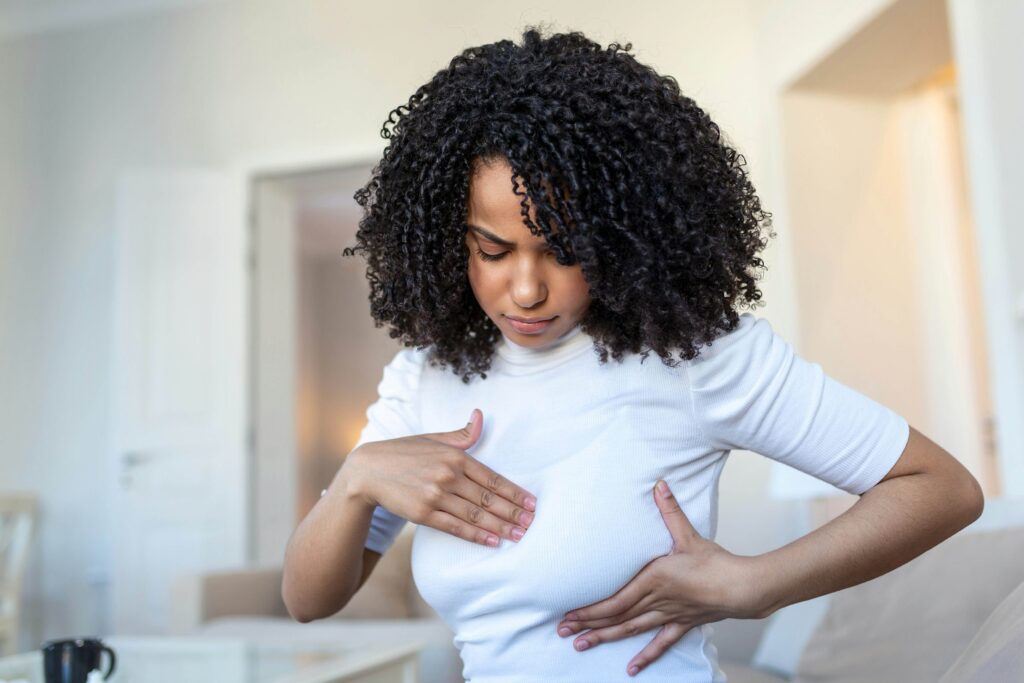
- 97% people believe NHS breast screening should be offered to people outside the current age range of 50–70 (around 29,680 cases per year are diagnosed outside the 50–70 age range, which is over half of all breast cancer diagnoses) *.
- 85% don’t feel confident checking their breasts or chest
- Only one in four check their breasts or chest once a month, as recommended by the NHS
London, UK – An overwhelming 97% of people are backing a call by cancer charity Walk the Walk for expanding routine NHS breast screenings (mammograms) to be made available to under 50s and over 70s.
This comes following a survey by the charity (best known for its iconic MoonWalk and Walking fundraising events) that investigated:
- Public attitudes to breast cancer and routine self-checking’ as a means of early detection
- Understanding of secondary cancers
- The impact of healthy lifestyles choices in cancer prevention and treatment
The findings highlight the urgent need for better education and screening as Breast Cancer Awareness Month (October) shines a spotlight on this type of cancer which is the most common cause of death for women aged 35–49 in England and Wales (2022, Office for National Statistics).
Breast cancer, which affects both women and men, is the most common cancer in the UK, and Walk the Walk’s survey of 1160 people uncovered worrying gaps in awareness and confidence in self-checking.
Shockingly, 85% of people said they don’t know what to do and don’t feel confident checking their breasts or chest. Only one in four check their breasts or chest once a month, as recommended by the NHS, and almost half of people (46%) don’t have an understanding of secondary breast cancer.
Founder and Chief Executive of Walk the Walk Nina Barough CBE, who is a national walking ambassador and campaigns for greater awareness of how lifestyle changes and living an active lifestyle through walking said:
These statistics are a wake-up call. People clearly want greater access to mammograms, especially as so many don’t feel equipped to check their own breasts or chest with confidence.
I strongly recommend that if you are between the age of 50 – 70, be sure to use your opportunity for a routine mammogram appointment. But if you are outside this age group please don’t assume you won’t be affected. We know, the earlier breast cancer is diagnosed, the easier it could potentially be treated with a successful outcome.
Sometimes you won’t be able feel a lump yourself, but a mammogram could detect it, which is why we are calling for an expansion to the current screening policy. If you have noticed any changes to your breasts between scans, or you are outside the age range for a routine mammogram, contact your doctor to get yourself checked, make it a priority this Breast Cancer Awareness Month, it could save your life.
Walk the Walk is urging everyone, women and men, to make breast and chest checking part of their regular self-care routine. Knowing what is normal for you is the first step in spotting changes early, when treatment is often more successful.
Angela’s story: “thank goodness for mammograms”
For many, mammograms are life-saving. Angela, 53, from Livingstone, Scotland, was diagnosed with an early-stage form of breast cancer (DCIS) last year after a routine mammogram. She had no symptoms — no lumps, no rash and no puckering of the skin.
Angela said:
I’d had two very routine mammograms before, so I didn’t expect this one to be any different. But not long after, I was called back and told there was an area in my left breast that needed investigating.
It was a huge shock when I was diagnosed with breast cancer. Without that mammogram, it may never have been found until it had spread. Thank goodness for the national screening programme — if breast cancer is caught early enough, a lot can be done to prevent it spreading.”
Angela underwent surgery, radiotherapy and hormone therapy, and is now back to her normal life. In September, she took part in the Full Moon (26.2 miles) at The MoonWalk Scotland to give back after the support she received.
I feel incredibly thankful for the mammogram which discovered my cancer when it did. I’d urge everyone who is invited to take up the offer of a mammogram. It could save your life.
The power of walking
The survey also revealed that around two thirds of people (36%) feel they don’t exercise enough. Walk the Walk’s philosophy is that walking is one of the most accessible and effective ways to improve overall health, boost wellbeing and help reduce the risk of preventable cancers.
Walk the Walk hopes to reduce the four out of ten cancer diagnoses which are lifestyle-related and to champion world leading integrated care which allows people to live well during treatment and beyond their diagnosis.
As the UK’s National Walking Ambassador, Nina champions walking not only as a simple, free activity but also as a life-affirming way to improve wellbeing, connect with others, and live more healthily.
Through iconic events like the MoonWalk, campaigning work, and funding ground-breaking projects, Walk the Walk empowers people to walk with awareness knowing they are improving their health and wellbeing.
For more information about Walk the Walk and to sign up for the MoonWalk 2026, visit: www.walkthewalk.org
NOTES TO EDITORS
Sources:
- BMJ: The Overlooked Incidence and Mortality of Breast Cancer in Older Adults | The BMJ
- Cancer Research UK: Breast cancer statistics | Cancer Research UK
About Walk the Walk
Walk the Walk is a cancer charity, which is passionate about encouraging women and men to become more aware of their potential for their own well-being by becoming fitter and healthier.
The charity is best known as the organiser of its flagship overnight MoonWalk fundraising events.
Walkers taking part in these events wear the charity’s statement decorated bras or brightly coloured bra t-shirts, to raise awareness and funds for cancer prevention, research, and the emotional and physical care of those living with cancer.
Walk the Walk specialises in creating walking challenges and treks ranging from 5km to 100 miles and more.
Walk the Walk also started the campaigns that Men Can Get Breast Cancer Too, and Anyone Can Get Breast Cancer, raising awareness for men.
Walk the Walk has raised in excess of £146 million to date.
For more information
Contact [email protected]
0117 925 1358

